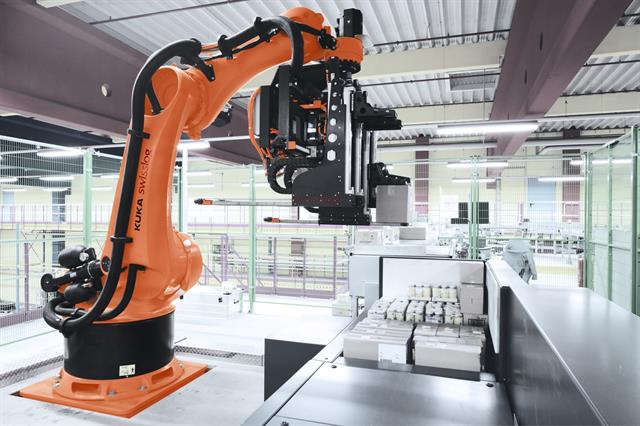 Paul Stringleman |
Paul Stringleman is a senior consultant with Swisslog Australia, which designs, develops, and delivers best-in-class automation for forward-thinking health systems, warehouses, and distribution centres.
For a long time, the primary driver of warehousing and logistics automation advances has been efficiency. Robots and machinery can perform repetitive and complex tasks faster, more safely and with greater precision than manual methods ever could.
But what about the environmental benefits of automation?
These benefits may not always be the most obvious focus when it comes to warehousing and logistics applications, but in an increasingly environmentally conscious world, any technology that can save costs and help to achieve sustainable, eco-friendly outcomes has a competitive edge.
Less space, better hygiene and reduced fossil fuel needs are major assets for distribution facilities located in densely populated areas or near residential areas. The advantages of automation (including those that follow) make logistics facilities more neighbourhood-friendly.
A smaller footprintAmong many of the benefits of automation is the environmental advantage of occupying a smaller physical footprint in a warehouse or logistics facility. Products can be stacked neatly, almost right to the roof, and an automated storage and retrieval system (ASRS) can swiftly select products from anywhere in a compact grid.
Not only is less land required for a fully functioning warehouse, but the carbon footprint is further reduced when you consider that a smaller space will need less electricity, water and other resources. Based on Swisslog's past projects, when comparing a manual warehouse to an ASRS, up to 60% less space is required.
 Automation has allowed companies to invest in more eco-friendly packaging |
So, if a business needs 10,000 sqm for a manual warehouse, but an automated solution means you can perform all the company's delivery needs within a 4,000 sqm space, the leasing costs reduce by AUD750,000 per year, if you take a price of AUD125 per square metre in Sydney.
And existing sites that are retrofitted or refurbished with automation technologies can use the space saved for other profit-generating activities or optimised processes for changes in the business model.
Naturally, these figures are only hypothetical, but there will always be some level of savings by reducing the size of the space needed for the warehouse and logistics operations.
Reduced power consumptionAn ASRS can operate in the dark, leading to significant savings in electricity and carbon emissions. And, as technology advances, further power-saving features are incorporated into automated warehouses, including functions where robots 'go to sleep' to save power when not in use.
Off-peak power can also be utilised, with automated technologies able to work around the clock, and be controlled remotely, which provides a cost saving as well as environmental benefits.
Typically, an intelligent Warehouse Management Software system will control the entire automated operation, and will automatically calculate the most efficient way to operate all machinery and achieve desired outcomes.
With Industry 4.0 advances - machines talking to machines - operators aren't required to be on-site 24/7. They can control the technology remotely, saving road traffic to and from the plant.
Shifting away from fossil fuelsThe carbon footprint of a warehouse or logistics facility is further reduced when automation technologies perform tasks previously undertaken by fossil fuel-powered materials handling alternatives.
Heavy-duty manually operated machinery emits more CO2 into the environment, compared with its electric counterparts, so automated machines can help reduce total carbon emissions of a facility. Additionally, automated technologies are far quieter than fleets of fossil fuel-powered vehicles.
Electric vehicles provide an alternative to fossil fuels, but they are not cheap, and the technology is constantly evolving. Even fleets of individual electric standard lift vehicles can cost from $20,000 - $50,000 each to purchase, or $200-300 (or more) per week to lease, and they need continuous updating.
Health, safety and hygieneReduced manual handling of goods - particularly in food, beverage and pharmaceutical applications - has broader long-term sustainability benefits to society, including lowering the risk of product contamination or product tampering.
The crippling costs of a product recall - including product disposal, business interruption, customer reimbursement as well as damage to brand reputation - are something no business wants to endure.
Naturally, hygiene benefits have never been more apparent than in a post-Covid world, where hygiene is top of mind for all companies and individuals. In a post-Covid world, hygiene is not an option for a sustainable business - it is a necessity.
Long-term sustainability is also further enhanced by a greater level of worker safety. With workers no longer having to go deep (or high) into racking to retrieve products, the risk of injury (both repetitive strain and accidental) is reduced. Workers in an automated warehouse - from technology controllers, to maintenance crews, to warehouse managers - typically have a safer, healthier job than manual labour workers in older warehouses.
Green packagingOne change many larger companies are adopting globally is the utilisation of more environmentally friendly packaging, including materials that biodegrade more easily over time.
However, a disadvantage of eco-friendly packaging is that it's often more prone to breakages in the handling process. Automation technology can apply a smooth, gentle touch, which has allowed greener packaging to be employed by more companies. From conveyors to pickers to robots and automated vehicles, automation technologies have allowed for greener packaging to be used without compromising the integrity of the product during the handling process.
Profitability and sustainability: a win-winThe efficiency and productivity benefits of automated warehousing or logistics operations have been proven in service worldwide. And these benefits contribute to better profitability over a sustained period, as operations are further tailored to meet customer needs and eliminate inefficiencies.
When you add environmental sustainability benefits into the same equation, it's truly a win-win for the operator. And while the environmental win might be a desirable - but secondary - benefit for now, it's only a matter of time before the majority of new facilities are constructed to be as eco-friendly as possible - and existing facilities are more widely retrofitted to achieve greater standards of environmental sustainability.
As this global trend towards greater sustainability continues, automation will be a major driver in making it possible.